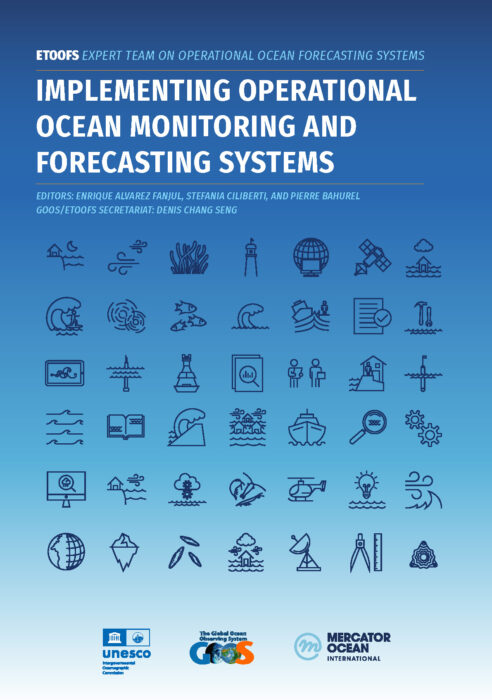
Introduction
On the 1st of July at the United Nations Ocean Conference in Lisbon, the Global Ocean Observing System (GOOS) and its Expert Team on Operational Ocean Forecasting Systems (ETOOFS) announced the release of a Guide on “Implementing Operational Ocean Monitoring and Forecasting Systems”.
Initiated at the request of the Intergovernmental Oceanographic Commission of the UNESCO (IOC-UNESCO) and the World Meteorological Organisation (WMO), the guide was funded by GOOS and Mercator Ocean International. It was produced thanks to the cooperation of 51 institutions from 18 countries worldwide. Moreover, 80 authors have participated in the writing, under the coordination of the editors Enrique Alvarez Fanjul, Stefania Ciliberti, and Pierre Bahurel.
This technical guide sets a new highly-needed standard in digital oceanography. It will facilitate completion of the new, fuller value chain of modern operational ocean data processing and forecasting systems.
— Vladimir Ryabinin, the Executive Secretary of the Intergovernmental Oceanographic Commission (IOC) of UNESCO
Objectives
The guide aims to promote the development of new marine forecasting systems around the globe; along with the improvement of the existing ones. Indeed, it provides an overview of the value chain of an operational ocean forecasting system (OOFS) as well as international standards and best practices for setting up such a service. Weighing in at 400 pages, the guide is a unique and comprehensive reference document for the operational ocean modeling community. It covers key areas of OOFS, focusing on their current state of the art as well as their future developments.
This is a testament to the resolve of the ocean forecasting community to build upon and democratise oceanographic knowledge and expertise, and by doing so contributing to a more sustainable ocean for all.
— Pierre Bahurel, Director General of Mercator Ocean International
With this guide, ETOOFS intends to provide inspiration and guidelines to professionals worldwide. If this is achieved, it is expected to foster a generation of information to support decision-making processes; and thus, to advocate for a more informed and sustainable relationship with our ocean.

In the picture, from left to right: Pierre Bahurel, Director General of Mercator Ocean International; Vladimir Ryabinin, Executive Secretary at Intergovernmental Oceanographic Commission of UNESCO; Enrique Alvarez Fanjul, technical coordinator of the OceanPrediction Decade Collaborative Center at Mercator Ocean International.
It is a truly defining moment due to persistent work to finally release the guide for the benefit of the ocean forecasting community and society. However, it is through people engagement, training and capacity building that we find the full value of such a rich knowledge product.
— Denis Chang Seng, GOOS ETOOFS officer and IOC Programme Specialist
A summary has also been released to highlight and synthesize key points of the guide.
